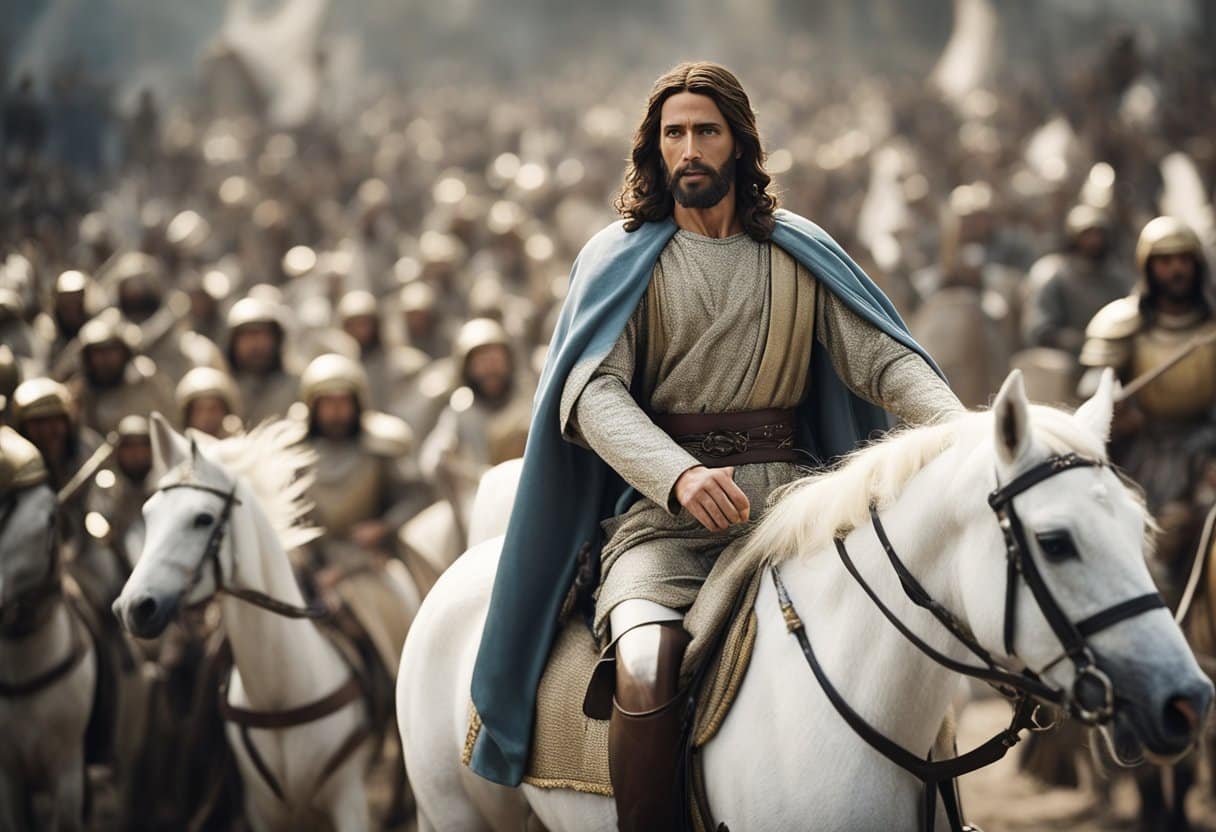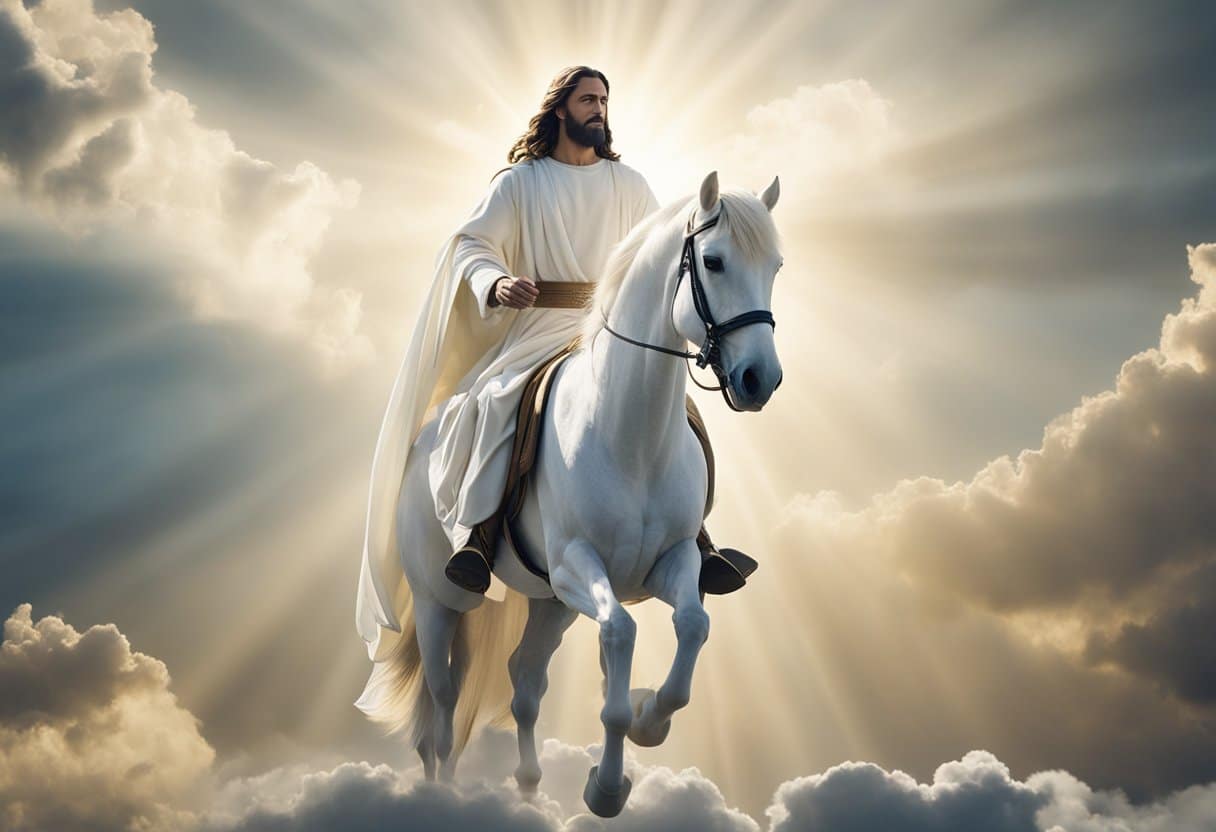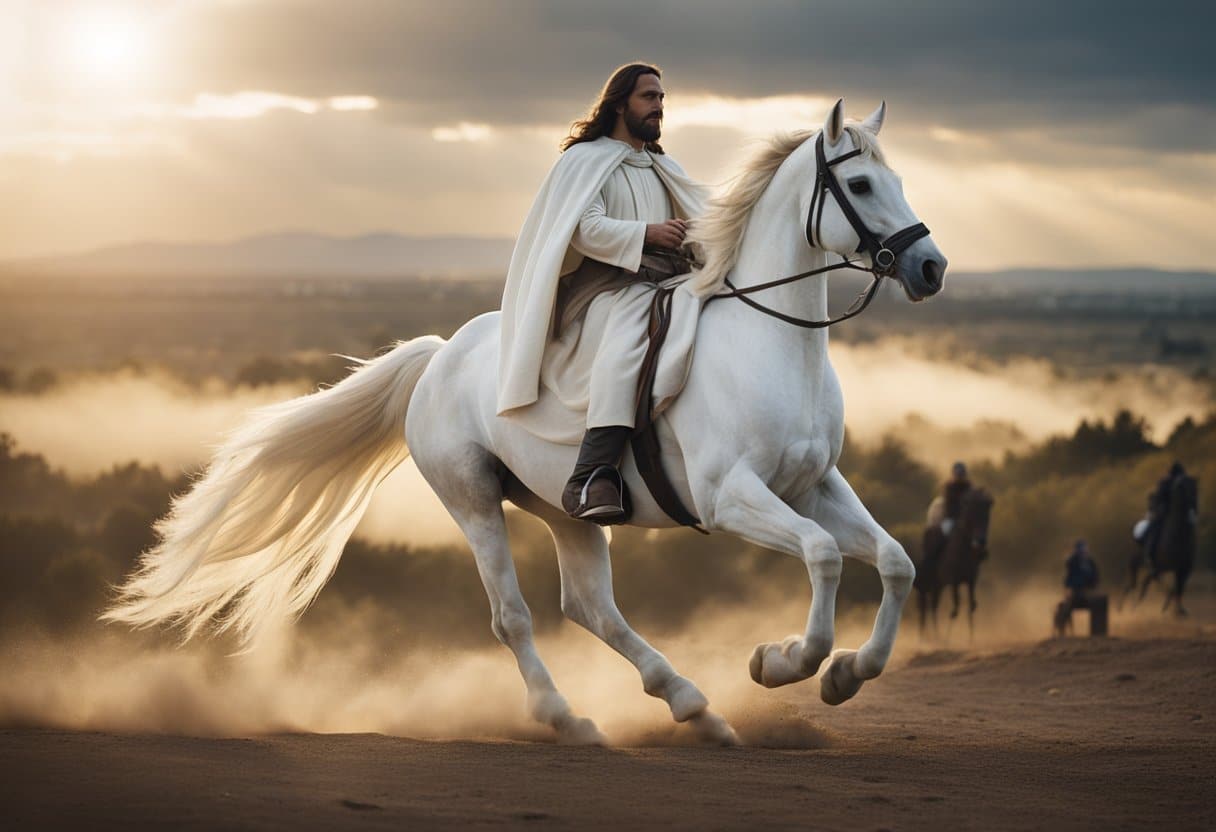If you are a Christian, you may have heard of the prophecy that Jesus will return on a white horse.
This idea has been popularized in many books, movies, and songs. But is this really what the Bible teaches?
In this article, I will analyze the biblical basis for this belief and explore what it means for us today.

The idea of Jesus returning on a white horse comes from the book of Revelation, which is the last book in the New Testament.
In chapter 19, John has a vision of heaven opening up and Jesus riding out on a white horse, followed by an army of angels and saints.
This image has been interpreted in various ways throughout history, with some seeing it as a literal event and others as a symbolic representation of Jesus’ victory over evil.
So what does this mean for us today? Whether will Jesus return on a white horse or not, the message of Revelation 19 is clear: Jesus is coming back to establish his kingdom on earth and defeat all evil.
As Christians, we are called to live in anticipation of this event, working to bring about God’s kingdom here on earth and sharing the good news of Jesus with others.
Biblical Prophecy of the Second Coming on a White Horse
The Second Coming of Jesus Christ is a central doctrine of Christianity, and its prophecy is recorded in the Bible, particularly in the Book of Revelation.
This section will delve into the biblical prophecy of the Second Coming, focusing on Revelation 19 and the symbolism of the white horse.
Revelation 19: The Vision of Christ’s Return
Revelation 19 provides a vivid vision of Christ’s return to earth on a white horse. In this chapter, John, the author of Revelation, describes a scene in which he sees heaven open, and a white horse appears, with its rider called Faithful and True.
The rider is identified as Jesus Christ, who is described as having eyes like a flame of fire, and on his head are many crowns. He is dressed in a robe dipped in blood, and his name is the Word of God.
The armies of heaven, clothed in fine linen, white and clean, follow Jesus on white horses.
Out of his mouth comes a sharp sword, with which he will strike the nations. The chapter goes on to describe the defeat of the beast and the false prophet, who are thrown into the lake of fire.
Symbolism of the White Horse
The white horse is a powerful symbol in the Bible, representing victory, triumph, and purity. In Revelation 6, the first of the Four Horsemen of the Apocalypse rides a white horse, symbolizing conquest.
However, the white horse in Revelation 19 is different, representing the triumph of Jesus Christ over evil and sin.
The white horse is also a symbol of purity, representing the righteousness of Jesus Christ.
The fact that Jesus rides a white horse emphasizes his purity and holiness, and his victory over sin and death.
In conclusion, the biblical prophecy of the Second Coming is an essential doctrine of Christianity, and its prophecy is recorded in the Bible, particularly in the Book of Revelation.
Revelation 19 provides a vivid vision of Christ’s return to earth on a white horse, with his armies following him.
The white horse is a powerful symbol of victory, triumph, and purity, emphasizing the righteousness of Jesus Christ and his victory over sin and death.
The Identity of the Rider

When it comes to the identity of the rider on the white horse in Revelation 19:11-16, there is little doubt among scholars that it is referring to Jesus Christ.
The passage describes the rider as having many titles and names, including “Faithful and True,” “Word of God,” “King of Kings,” and “Lord of Lords.” These titles and names are all indicative of Jesus and his divine nature.
Titles and Names of the Rider
The title “Faithful and True” emphasizes Jesus’ trustworthiness and reliability. It is a reminder that he is always true to his word and promises.
The title “Word of God” is a reference to John 1:1, which states that “In the beginning was the Word, and the Word was with God, and the Word was God.”
This title emphasizes Jesus’ divine nature and his role as the ultimate revelation of God to humanity.
The titles “King of Kings” and “Lord of Lords” emphasize Jesus’ sovereignty and power. They are a reminder that he is the ultimate ruler over all of creation and that every knee will bow and every tongue will confess that he is Lord (Philippians 2:10-11).
The Robe Dipped in Blood
One of the most striking images in this passage is the description of the rider’s robe as being “dipped in blood” (Revelation 19:13).
This imagery is often interpreted as a reference to Jesus’ sacrifice on the cross, where his blood was shed for the forgiveness of sins. It is a reminder that Jesus’ victory over sin and death was won through his death and resurrection.
In conclusion, the rider on the white horse in Revelation 19:11-16 is identified as Jesus Christ. The various titles and names given to him emphasize his divine nature, sovereignty, and trustworthiness.
The imagery of the robe dipped in blood serves as a powerful reminder of the sacrifice that Jesus made on the cross for the forgiveness of sins.
The Imagery of Warfare and Judgment

When it comes to the imagery of Jesus’ return, the white horse is one of the most prominent symbols. The white horse represents a righteous war, and the armies of heaven will accompany Jesus in this battle.
The Book of Revelation describes this imagery in detail, and it’s important to understand the symbolism behind it.
Armies of Heaven and the War
In Revelation 19, John describes Jesus’ return on a white horse, and he notes that “the armies of heaven were following him, riding on white horses and dressed in fine linen, white and clean” (Revelation 19:14).
This imagery of the armies of heaven riding on white horses suggests that they are coming to engage in battle. The white horses symbolize purity and righteousness, and the armies of heaven represent the just and righteous forces of God.
The battle that is described in Revelation 19 is a righteous war, fought against the forces of evil.
The imagery of the battle is intense, with Jesus wielding a sword and blazing fire coming from his eyes (Revelation 19:12-13). This imagery suggests that the battle will be fierce and that the forces of evil will be defeated.
Judgment and the Defeat of Evil
The imagery of the white horse and the armies of heaven also represents judgment. The forces of evil will be defeated, and they will be judged accordingly.
The Book of Revelation describes the judgment of the wicked in detail, with the beast and the false prophet being thrown into the lake of fire (Revelation 19:20).
The imagery of the white horse and the armies of heaven also represents justice. The forces of evil will be defeated, and justice will prevail.
The imagery of the blazing fire and the sword suggests that the battle will be a righteous one, fought for a just cause.
The imagery of the white horse and the armies of heaven also represents judgment and justice, with the forces of evil being defeated and justice prevailing.
Theological Interpretations of Jesus and White Horse

When it comes to the return of Jesus on a white horse, there are various theological interpretations.
Some theologians interpret the white horse as a symbol of Christ’s triumph, victory, and power. Others interpret it as a symbol of Christ as a conqueror and king.
Christ as Conqueror and King
According to this interpretation, the white horse symbolizes Christ’s role as a conqueror and king. The rider on the white horse is faithful and true, and he is coming to judge and make war against the wicked.
This interpretation emphasizes the power and authority of Christ as the King of Kings and Lord of Lords.
The Role of Faith and the Church
Another theological interpretation of the white horse is that it represents the role of faith and the church in the return of Christ.
The rider on the white horse is accompanied by the saints, who are clothed in fine linen and riding on white horses. This symbolizes the faithful believers who have been redeemed by Christ and are now part of his victorious army.
The church plays a critical role in preparing for the return of Christ. The church is called to proclaim the gospel of Christ, to make disciples of all nations, and to live in a manner that is pleasing to God.
So, will Jesus return on a white horse? This could be a reminder that the church is not alone in its mission. Christ is with his church, and he will ultimately triumph over all evil.
Eschatological Significance and Modern Relevance

End Times and the Modern Believer
As a believer, you have likely heard about the return of Jesus Christ. This event is often referred to as the Second Coming. According to the Bible, Jesus will return to Earth to judge the living and the dead.
The Bible also states that Jesus will return on a white horse (Revelation 19:11). This has led to much speculation about the significance of the white horse and what it means for the end times.
Many Christians believe that the return of Jesus is imminent and that we are living in the end times. They point to the signs of the times, such as wars, natural disasters, and the rise of evil in the world.
The white horse is seen as a symbol of victory and triumph over evil. It represents the power and authority of Jesus Christ as he returns to Earth to establish his kingdom.
Applying Revelation to Contemporary Life
While the book of Revelation may seem like a difficult and confusing book, it contains many important messages for modern believers.
The white horse is just one of the many symbols found in this book. It is important to understand the meaning behind these symbols and how they can be applied to our lives today.
One way to apply the message of the white horse is to focus on the victory and triumph of Jesus Christ over evil.
This can inspire us to live our lives in a way that honors God and opposes evil. We can also find hope in the fact that Jesus is in control and that he will ultimately triumph over all evil.
Another way to apply the message of the white horse is to focus on the power and authority of Jesus Christ.
This can inspire us to trust in God and to seek his guidance and direction in our lives. We can also find comfort in the fact that Jesus is with us always, even in the midst of difficult times.
